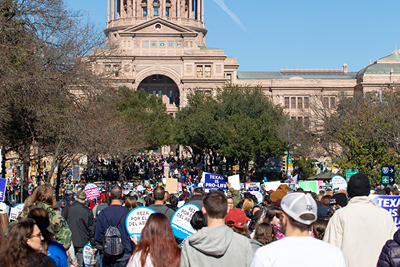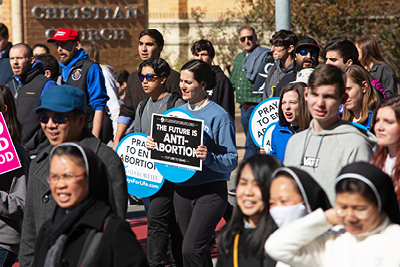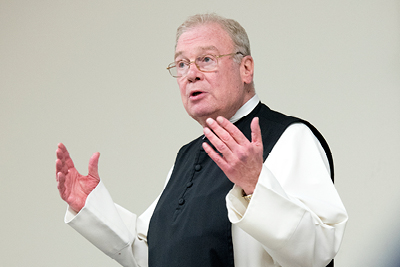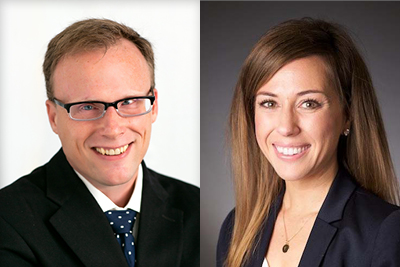 Menu
Menu




By Clare Venegas
The theme of President Jonathan J. Sanford’s inaugural year as the University of Dallas’ 10th president – Arete: Renewing Culture through Educational Excellence – befits a bold premise: that culture can be renewed through education.
Whether in law, politics, education, business or service to the Church, evidence abounds of ways in which UD alumni, by virtue of the unique liberal arts education they receive, can be catalysts for cultural change.
Case in point: two UD alumni at the forefront of reversing Roe v. Wade through the recently decided Dobbs v. Jackson Women’s Health Organization Supreme Court case.
For both Jameson Taylor, MA ’98 PhD ’07, a politics graduate, Mississippi lobbyist and president of the Center for Political Renewal, and Kellie Fiedorek, BA ’06, a theology alumna and Washington, D.C., attorney at Alliance Defending Freedom, the education they received at UD was pivotal to finding their vocations and the work they’re doing today – work that led them to play crucial roles in launching Dobbs, the proverbial pebble that toppled Roe.
Taylor earned his Ph.D. in politics from UD’s Braniff Graduate School of Liberal Arts, after obtaining his bachelor's degree from a “little Ivie” liberal arts college in New England. But it wasn’t until he began his graduate studies at UD that he realized how much he hadn’t learned.
“It wasn’t just about studying Plato and Aquinas, but having the freedom of studying the great thinkers in the Western tradition who have different views, like Nietzsche and Machiavelli. This prepares you to enter into productive dialogue with different people,” Taylor said.
After graduating from UD, Taylor began working for a large national pro-life organization outside of Washington, D.C. But it was in his work at a number of state-based public policy think tanks that Taylor realized the tremendous impact states could have on national issues.
“My philosophy was ‘go big or go home,’ but big ideas aren’t going to happen at the federal level. It’s really at the state level where big ideas start, and I believe states need to be more active in pushing good laws.” Since moving to Mississippi, he has been a lobbyist focused on life, family and religious freedom issues.
Taylor admits being a lobbyist comes with certain negative connotations, but he sees his work as leadership development, in creating opportunities for lawmakers to excel: “For legislators, I am working to give them opportunities to be the best versions of themselves by giving them the tools and resources they need to make the right decisions.”
He noted, “As a lobbyist I work with a lot of different people with a lot of different views. Because of my education at UD, I don’t bring any idealism to the job, but have been very realistic about what can be accomplished in the political realm. I got that from reading Plato’s Republic.”
Some may think passing pro-life legislation would be easy in a red state like Mississippi, but, Taylor notes, people forget that until 2011, Democrats controlled both chambers of the legislature for decades. Even once Republicans gained control in 2012, several attempts to pass bills banning abortion before 20 weeks’ gestation had failed over concerns about challenging the Roe/Casey viability standard. Add to that the reality that, as Taylor observed, “Every state legislature, no matter where you are, is risk-averse. They don't necessarily want to pass a bill that will get litigated. Usually when you introduce a new bill, the first question is, where else has this been done?”
Still, Taylor saw an opportunity “to do something big” in Mississippi on the pro-life issue leading into the 2018 legislative session.
He consulted with Kellie Fiedorek, an attorney with Alliance Defending Freedom, a national public interest law firm committed to defending religious freedom, free speech, marriage and the family, parental rights and the sanctity of life.
Fiedorek, one of six children, began at UD as a politics major, but later switched to theology the fall after her Rome semester. As graduation loomed closer, “I felt God calling me to pursue a vocation in law and to use my law degree to advance something I’d always been passionate about: upholding the dignity of women, the dignity of the unborn, the dignity of the family. Something UD really confirmed the Lord was calling me to advocate for.”
She added that while it is good so much of the pro-life movement’s focus had been on the unborn child, she really wanted to approach the issue wholistically with a greater focus on a culture that empowers women and celebrates motherhood. “Society unfairly tells women that they need abortions to be successful. That’s demeaning and untrue. I wanted to use my education to not only build a society that cherishes the unborn and ensures women have greater access to the support they deserve during pregnancy, but one that wholistically embraces and values women and motherhood and implements support systems that empower women to pursue full and flourishing lives for themselves and their families long after the baby is born.”
After graduating from Ave Maria Law School in 2009, she began at ADF in 2012, and in 2017, ADF invited key allies in the pro-life movement to come together and look at legal strategies, given where the court was then, to best challenge Roe v. Wade.
“In Roe v. Wade, the Court demeaned women’s dignity by saying motherhood ‘forced’ on us a ‘distressful life and future.’ That ruling was a shameful and dehumanizing characterization of the role women and mothers hold in society,” Fiedorek said.
Fiedorek explained that prior to Dobbs, the Supreme Court had said states may regulate abortion to advance three interests – to advance the health and safety of women; to protect the unborn child; and to safeguard the integrity of the medical profession.
“Laws like Mississippi’s are important because science shows there’s an increased risk that an abortion procedure will harm women in the second trimester, and at that same time the baby has a heartbeat, can sense pain, can hiccup and can taste things her mom eats,” Fiedorek explained. She began working with a number of states eager to pass legislation to promote life. Fiedorek began working with Taylor, whom she knew from working on previous legislation, and was hopeful that the Supreme Court might one day take the case and rule in favor of the law.
The two alumni worked with other attorneys at ADF to craft House Bill 1510, which made abortion illegal in Mississippi after 15 weeks. Meanwhile, Taylor secured the support of key state legislators, namely Rep. Becky Currie, a nurse and pro-life advocate, to sponsor the bill, and Rep. Andy Gibson, who was the bill’s driving force in the House.
Taylor credits a confluence of factors to the bill's success: willing legislators to sponsor the bill, willing leadership in the state house, and a strong, pro-life governor. “Many of them are lawyers, and we had to be prepared to answer every question,” he said. “ADF was a great resource to provide answers and help put policymakers at ease.”
Public opinion in Mississippi, Taylor added, was very much in favor of the bill, and a majority of both Republicans and Democrats are pro-life, which made the landscape for passage somewhat easier.
Also critical to the success of the bill was Taylor’s work in building grassroots support. Through his previous work (also with ADF) in strengthening conscience protections for people of faith, he had gained the trust of a broad coalition of churches from diverse faith backgrounds who recognized the importance of being active in politics and could set aside theological differences to unite on issues.
“Studying the great thinkers you realize that there’s a lot of disagreement within the Western canon,” Taylor said. “Now, I realize I wouldn’t have been as effective in this work had I not gone to UD. It was at UD where I learned how to dialogue with people who have different thoughts and beliefs.”
Still, Taylor's Catholic faith is essential to his work in the public square – “everything I do is covered in prayer” – and he reflected on how much his faith matured during his time at UD.
“I was immature in my faith when I came to UD. I learned how to pray from a great priest, Rev. John Collet, OMI, who taught theology at UD. The combination of those two things – prayer and being able to relate to and dialogue with different people – has really been behind the work I’ve done, and the success I’ve had in building these coalitions.”
In fact, during the votes on the bill, Taylor would walk around the capitol building in prayer, and called on extra prayer support during key moments as the law was challenged in the courts.
“When the Dobbs case was stuck before the Supreme Court for almost a year, I had moved on to other work,” Taylor recounted. “I just thought the Court wouldn’t take it up. But then I was inspired to call up the Sisters of Life and asked them to pray that the Court would take up the case, and literally, one month to the day, the Court announced they would.”
“God’s faithfulness has been so evident throughout the Dobbs case,” Fiedorek said. “He put exactly the right people at the right time to see His will done in this case. Mississippi Attorney General Lynn Fitch and her Solicitor General Scott Stewart, in particular, were courageous in how they litigated this case. If they hadn’t boldly asked the Supreme Court to overturn Roe, I don’t think we’d have this monumental victory today. I learned at UD from so many amazing professors, but something Father James Lehrberger told me that has always encouraged me is to be bold and fearless for the truth and let God take care of the rest. I think a lot of people exemplified that virtue in this case.”
Reflecting back on the events now, Taylor observed, “It was a very organic thing how this all came together. From getting the legislation passed, to the fact that President Trump appointed these particular Supreme Court justices. Here in Mississippi, we had a new attorney general who was willing to ask the Supreme Court to not only uphold the Mississippi law, but also to overturn Roe. And, of course, we had the Sisters of Life praying. God did this.”
Taylor concluded: “I couldn’t do what I do now without the education I received at the University of Dallas. Studying the Western Tradition is so valuable because it prepares you for all sorts of amazing professions that allow you to take risks, to change our culture for the better, and to share the Gospel. UD taught me the value of prayer, of humility, and of being comfortable with ambiguity and disagreement.”